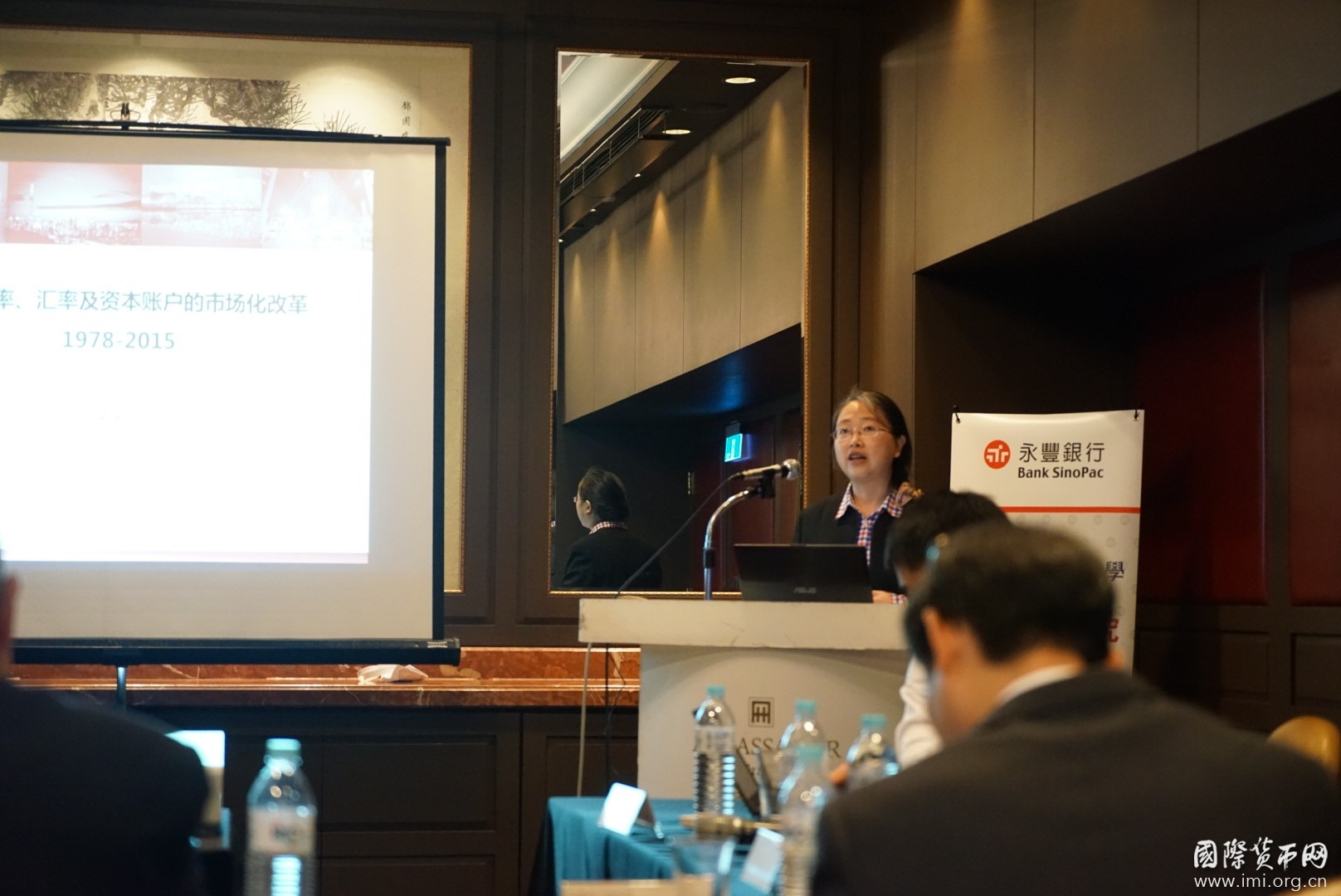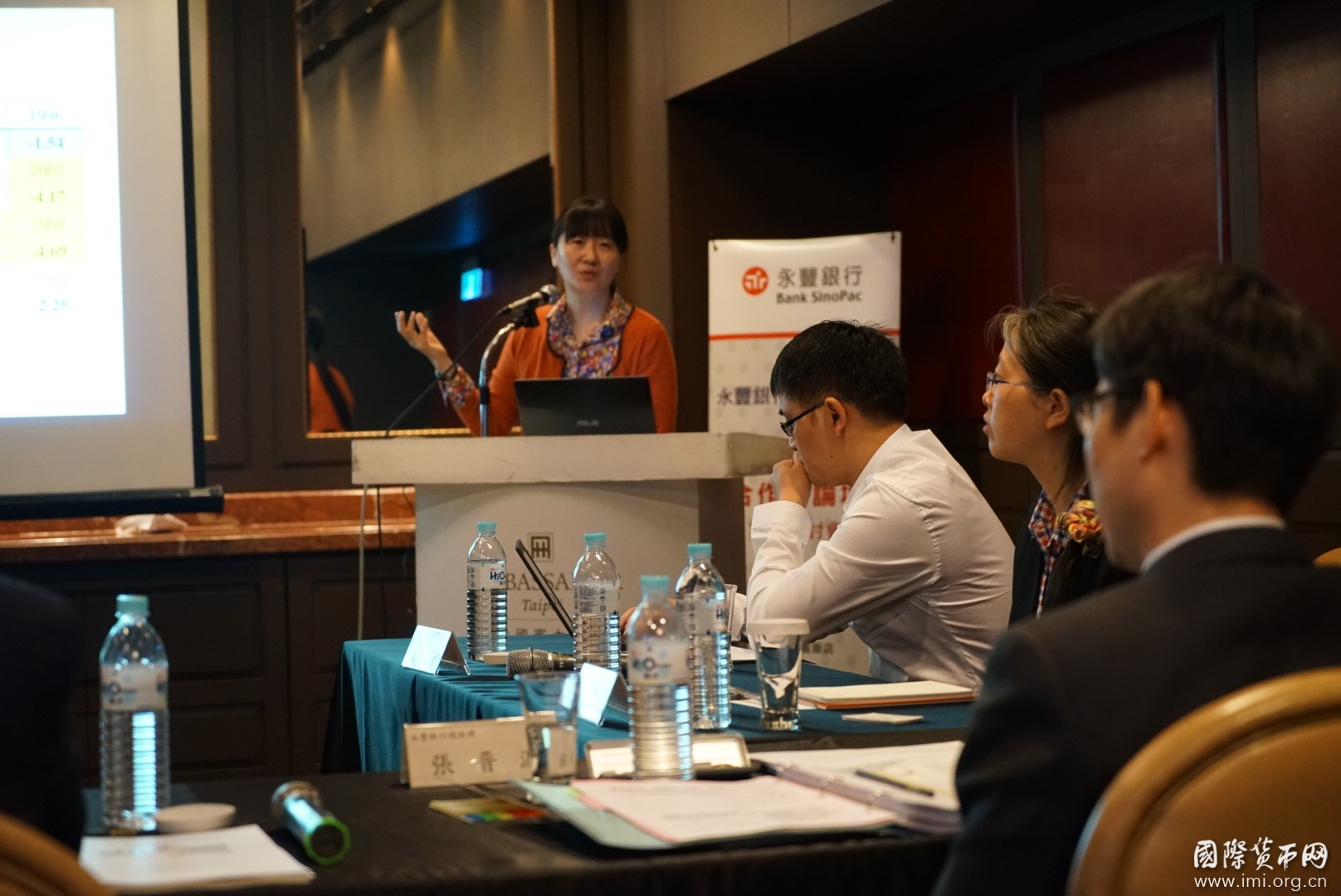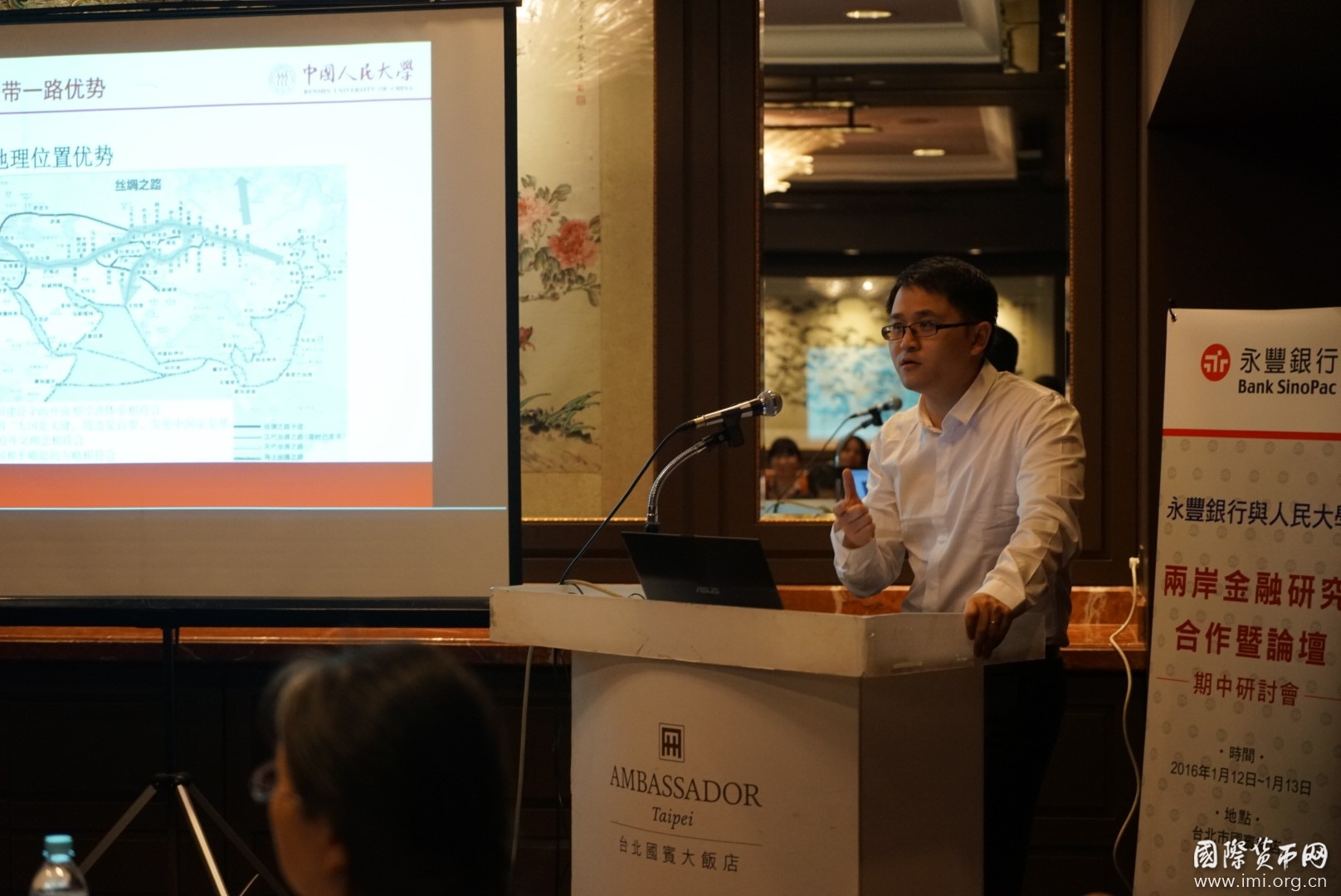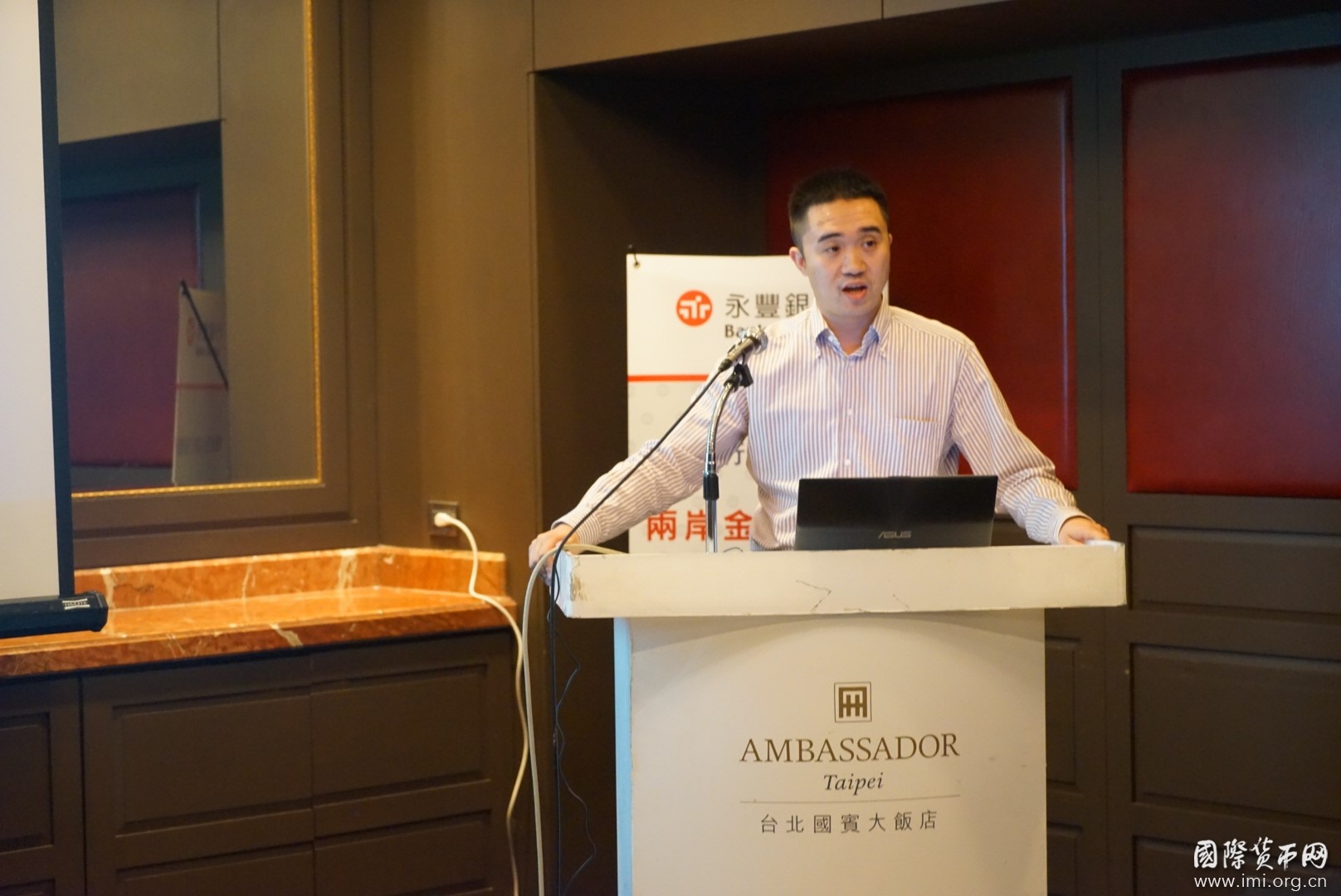Research Team led by Prof. Tu Yonghong Visits Taiwan to Explore Modes of Cross-Straits Financial Cooperation
2016-01-16 IMI Prof. Tu Yonghong centered on the mainland’s marketization reform of interest rate, exchange rate and capital account and reviewed the entire process in which the mainland’s marketization reform had been launched, promoted, and deepened during the past 37 years. She particularly explained why and how reform policies were made based on the macro situation and momentous events in each stage so as to accommodate the overall reform goals. She resumed to summarize historical experiences and put forward sensible suggestions for the future direction of China’s marketization reform.
Prof. Tu Yonghong centered on the mainland’s marketization reform of interest rate, exchange rate and capital account and reviewed the entire process in which the mainland’s marketization reform had been launched, promoted, and deepened during the past 37 years. She particularly explained why and how reform policies were made based on the macro situation and momentous events in each stage so as to accommodate the overall reform goals. She resumed to summarize historical experiences and put forward sensible suggestions for the future direction of China’s marketization reform.
 Prof. Wang Fang gave a keynote speech under the title of “New Triffin Dilemma and RMB Internationalization”. She started with the US current account deficits, laid special stress on analyzing the causes of the exacerbation of the US current accounts, and pointed out that there exists a long-term imbalance between economic imbalances and currency imbalances in the US. She mentioned that under the Jamaican currency system, the exacerbation of the US current accounts leads to the “New Triffin Dilemma”, which gives rise to frequent occurrence of international financial crises, as well as a “balance of terror” in the global economic and financial systems. Meanwhile, she expressed her suggestions and expectations for the RMB internationalization.
Prof. Wang Fang gave a keynote speech under the title of “New Triffin Dilemma and RMB Internationalization”. She started with the US current account deficits, laid special stress on analyzing the causes of the exacerbation of the US current accounts, and pointed out that there exists a long-term imbalance between economic imbalances and currency imbalances in the US. She mentioned that under the Jamaican currency system, the exacerbation of the US current accounts leads to the “New Triffin Dilemma”, which gives rise to frequent occurrence of international financial crises, as well as a “balance of terror” in the global economic and financial systems. Meanwhile, she expressed her suggestions and expectations for the RMB internationalization.
 Prof. He Qing delivered a keynote speech on the Belt and Road Initiative and mechanisms for cross-strait cooperation, in which he pointed out the advantages and opportunities for Taiwan to join the Belt and Road Initiative, and laid special stress on analyzing the characteristics of the six modes of cross-strait economic cooperation under the Economic Cooperation Framework Agreement (ECFA). He pointed out that cross-strait economic cooperation still faces many restrictions, and came up with five suggestions for enhancing the cross-strait economic cooperation and the regional integration.
Prof. He Qing delivered a keynote speech on the Belt and Road Initiative and mechanisms for cross-strait cooperation, in which he pointed out the advantages and opportunities for Taiwan to join the Belt and Road Initiative, and laid special stress on analyzing the characteristics of the six modes of cross-strait economic cooperation under the Economic Cooperation Framework Agreement (ECFA). He pointed out that cross-strait economic cooperation still faces many restrictions, and came up with five suggestions for enhancing the cross-strait economic cooperation and the regional integration.
 Prof. Qian Zongxin centered on the determinants of the offshore financial center’s core business and their reference for cross-strait financial cooperation. Based on regression analyses, he introduced the factors that determine the different development levels of offshore bonds business, money market business, and stock business in different offshore financial centers, and put forward policy suggestions for business development of the offshore financial center in cross-strait financial cooperation.
Prof. Qian Zongxin centered on the determinants of the offshore financial center’s core business and their reference for cross-strait financial cooperation. Based on regression analyses, he introduced the factors that determine the different development levels of offshore bonds business, money market business, and stock business in different offshore financial centers, and put forward policy suggestions for business development of the offshore financial center in cross-strait financial cooperation.
 Guests from the financial industry in Taiwan gave constructive comments on the speeches by IMI members. Mr. Qiu Zhengxiong reviewed the rate of change in capital intensity (NK/L) and the GDP growth rate of Taiwan manufacturing industry 1967 – 2013. He mentioned in particular that the most important objective of monetary policies is to increase employment, so in the future when making policies concerning interest rate and exchange rate people’s livelihood, employment and inflation should be the main focus. Mr. Xu Jiadong pointed out that RMB internationalization still needs to confront the “Triffin Dilemma”. He largely agreed with Prof. Wang Fang on her analyses of the exacerbation of the US current accounts and understanding of the role of the RMB internalization. He pointed out that the financial reforms in the mainland and in Taiwan share many similarities in interest rate liberalization, exchange rate reform, opening up of capital account, etc. He also put forward constructive views on the outlook of the mainland’s move to “comprehensively deepen the reform of financial system”. Mr. Zhou Ading reviewed in detail the history of the interest rate liberalization of Taiwan Dollar (TWD) and the opening up of capital account, and he put forward that in a small open economy, foreign investment determines stock prices and the exchange rate. He analyzed the increasingly important role of RMB in Taiwan’s financial market. Mr. Zhang Jinyuan reviewed how US dollar has established its credit system, analyzed what impacts strong currencies would have upon other economies after becoming international currencies, and gave his suggestions on RMB internationalization.
This forum is an important event during IMI’s study tour in Taiwan. Cross-strait financial cooperation and communication is the objective requirement of economic globalization and the inevitable choice of the cross-strait economic and financial relations. However, the financial circles of the two sides lack mutual understanding of each other’s financial policies and reform practices, and thus they could neither accommodate the changes of the environment for the cross-strait economic and trade exchanges and financial cooperation, nor grasp effectively the opportunity for cooperation. Therefore, IMI visited Taipei for a one-week study tour to local financial industries and institutions, aiming to acquire an in-depth and full understanding of Taiwan’s financial development, systematically summarize the experiences in financial reform and development, and compare the overall lines of thinking and mechanisms for making decisions of the two sides during their financial reforms, so as to explore feasible directions and modes for cross-strait financial cooperation. During the study tour, the team also visited influential local financial institutions including Small and Medium Enterprise Credit Guarantee Fund of Taiwan (Taiwan SMEG) and Bank Sinopac, and had an in-depth exchange of ideas with local experts and scholars.
Guests from the financial industry in Taiwan gave constructive comments on the speeches by IMI members. Mr. Qiu Zhengxiong reviewed the rate of change in capital intensity (NK/L) and the GDP growth rate of Taiwan manufacturing industry 1967 – 2013. He mentioned in particular that the most important objective of monetary policies is to increase employment, so in the future when making policies concerning interest rate and exchange rate people’s livelihood, employment and inflation should be the main focus. Mr. Xu Jiadong pointed out that RMB internationalization still needs to confront the “Triffin Dilemma”. He largely agreed with Prof. Wang Fang on her analyses of the exacerbation of the US current accounts and understanding of the role of the RMB internalization. He pointed out that the financial reforms in the mainland and in Taiwan share many similarities in interest rate liberalization, exchange rate reform, opening up of capital account, etc. He also put forward constructive views on the outlook of the mainland’s move to “comprehensively deepen the reform of financial system”. Mr. Zhou Ading reviewed in detail the history of the interest rate liberalization of Taiwan Dollar (TWD) and the opening up of capital account, and he put forward that in a small open economy, foreign investment determines stock prices and the exchange rate. He analyzed the increasingly important role of RMB in Taiwan’s financial market. Mr. Zhang Jinyuan reviewed how US dollar has established its credit system, analyzed what impacts strong currencies would have upon other economies after becoming international currencies, and gave his suggestions on RMB internationalization.
This forum is an important event during IMI’s study tour in Taiwan. Cross-strait financial cooperation and communication is the objective requirement of economic globalization and the inevitable choice of the cross-strait economic and financial relations. However, the financial circles of the two sides lack mutual understanding of each other’s financial policies and reform practices, and thus they could neither accommodate the changes of the environment for the cross-strait economic and trade exchanges and financial cooperation, nor grasp effectively the opportunity for cooperation. Therefore, IMI visited Taipei for a one-week study tour to local financial industries and institutions, aiming to acquire an in-depth and full understanding of Taiwan’s financial development, systematically summarize the experiences in financial reform and development, and compare the overall lines of thinking and mechanisms for making decisions of the two sides during their financial reforms, so as to explore feasible directions and modes for cross-strait financial cooperation. During the study tour, the team also visited influential local financial institutions including Small and Medium Enterprise Credit Guarantee Fund of Taiwan (Taiwan SMEG) and Bank Sinopac, and had an in-depth exchange of ideas with local experts and scholars.
